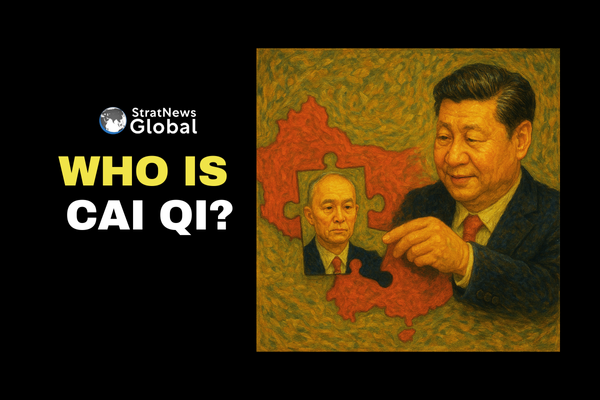Chinks in the bamboo curtain have been increasingly obvious as China’s commercial, technological and other interactions with the world increased over the last two decades. But the decision making at the highest levels of the Chinese Communist Party (CCP) have always been opaque, including and especially appointments.
At the SCO summit, Cai Qi the fifth-ranking member of the Politburo Standing Committee drew attention with a notable one-on-one meeting with Indian Prime Minister Narendra Modi. This came after Modi’s bilateral talks and pull-asides with President Xi Jinping and Russian President Vladimir Putin.
Cai also held meetings with Egyptian Prime Minister Mostafa Madbouly, Turkish President Recep Tayyip Erdoğan and Putin, further underscoring his growing diplomatic profile. He personally welcomed North Korean leader Kim Jong-un on his arrival, signalling the importance attached to his role.
Cai Qi was appointed CCP committee secretary of Beijing in 2017. Normally, such jobs go to members of the politburo, so in that sense he had broken a lot of conventions and clearly had high level backing. Five years later he made the big jump into the powerful General Office as its director.
What is the general office? It basically oversees the party’s internal machinery, from circulating decisions to ensuring the president’s instructions are enforced across ministries and provinces. It is like a command centre that can make things happen, whether it is resumption of civil flights between India and China, or border trade or even tackling China’s $100 billion trade surplus with India.
He can be seen as Xi’s chief of staff, so does that make him Xi’s potential successor? The pundits say no although they acknowledge Cai Qi’s proximity to China’s supreme leader.
Ratish Mehta of the Organisation for Research on China and Asia (ORCA) says “At 69, Cai will be too old by the next Party Congress to be considered a long-term successor. His role is about stability and continuity reminding domestic audiences that while others have fallen in anti-corruption drives, Xi’s most loyal confidants remain.”
“As Director of the General Office and first-ranked member of the Secretariat, Cai controls access to Xi and runs the Party’s internal machinery. His presence at the SCO reflects that institutional weight and signals the importance Beijing attaches to these meetings,” he said.
Manoj Kewalramani of the Takshashila Institution, argues that “His presence in Tianjin shows he enjoys Xi’s trust. This is a signal to Party leaders. It is less about grooming Cai for foreign policy and more about showing who has Xi’s ear.”
Cai Qi was present during Xi Jinping’s interaction with Narendra Modi at the SCO in Tianjin, and although India declined an invitation to a banquet that would be hosted by the former, he is a man to watch.
Prof. Jabin Jacob of Shiv Nadar University, says “Cai Qi is well known for his closeness to Xi Jinping and, therefore, will enjoy greater credibility when meeting with foreign leaders as someone who has Xi Jinping’s ear. From a foreign policy point of view, Cai can get things done for China.”
By sending a Politburo Standing Committee member, who ranks higher than the foreign minister, Beijing signals how seriously it takes the relationship. But there are other implications.
James Gethyn Evans, a China analyst at Harvard University, believes that “Dispatching Cai Qi instead of Premier Li Qiang or other senior Standing Committee members may be Xi’s way of making them compete for his favour. It helps Xi maintain power, but it could also upset those whose support he still needs. That said, Cai is also the ‘doer’ of the CCP.”
Cai’s rise also reflects another trend, says Prof Jacob, that of the party eclipsing state institutions.
“In the Chinese system, the ministry of foreign affairs has always been weaker than party organs. Under Xi Jinping, this party-state fusion has only intensified. The United Front Work Department has held ambassadorial postings in several countries, and the International Department has been particularly active meeting with foreign political parties and running training sessions on Xi Jinping Thought. Cai Qi’s activity can be seen as a natural step in this fusion.”
Research Associate at StratNewsGlobal, A keen observer of #China and Foreign Affairs. Writer, Weibo Trends, Analyst.
Twitter: @resham_sng





